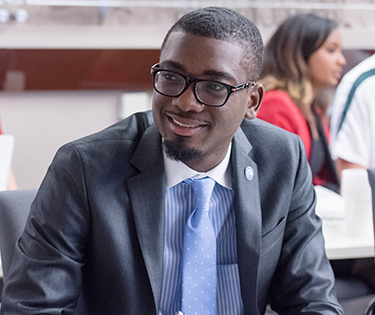
Jesse Calixte
A month after USC Shoah Foundation’s Intercollegiate Diversity Congress (IDC) Summit, Georgia State University Student Government Executive Vice President Jesse Calixte is still buzzing with ideas on how to make his university, the fourth most diverse in the country, more inclusive for all its students. Armed with testimony clips and other USC Shoah Foundation educational tools he obtained during the Summit, Calixte will have plenty with which to make an impact.
“Going to this summit was one of my best decisions so far as a student leader,” Calixte said.
Calixte attended the IDC Summit after first hearing USC Shoah Foundation Senior Director of Programs and Operations Kori Street’s keynote presentation at the National Campus Leadership Council’s Presidential Leadership Summit in Washington, D.C. in June.
There, Street introduced the student leaders to the assets USC Shoah Foundation has developed for student leaders– specifically, the genocide survivor testimonies it has clipped for associated activities, to encourage diversity and inclusion on campus. She also encouraged attendees to participate in USC Shoah Foundation’s first-ever IDC Summit at USC in October.
Calixte eagerly obliged.
“Before applying for the summit, I did some research about USC Shoah Foundation,” Calixte said. “I went on the website and was impressed by how much information it contained, and got to thinking about how I could bring the Institute’s resources to my campus. I wanted to learn more about the Institute, its purpose and how I could affiliate my university with it for a better university experience.”
At the IDC Summit, the Calixte and the other 20 participants – student leaders from universities across the country – learned about the Visual History Archive, IWitness and the Institute’s strategies for using testimony to promote tolerance and inclusion on college campuses.
Over the course of two days, Calixte and other attendees studied the role that storytelling plays on the general perspectives of an issue, interacted with the Institute’s New Dimensions in Testimony project, and had open conversations with other student leaders about how the testimonies within the Visual History Archive could be used in talking about the issues on their campuses.
“I learned a lot about storytelling and met amazing people at the conference, particularly the Shoah Foundation team,” Calixte said. “I was delighted to see how much they valued history and what they were doing to humanize people’s past experiences with technology.”
Calixte and his contemporaries also learned how to construct their own activities in IWitness, and had dinner with Yannick Tona, a child survivor of the Rwandan Tutsi Genocide who is now a motivational speaker in the United States.
“I learned how to effectively use the website, and I learned that we all have a vested interest in studying history,” Calixte said. “We find that, in knowing about the past, we enlighten our present, understand and build our identity. We must learn from the past to progress effectively.”
At large universities like GSU, with student bodies that are extremely diverse and passionate, it can be easy for students to become so zoned in on their own interests that they forget about the issues affecting their campus at large. That’s why Calixte believes it’s important for students to address topics surrounding diversity and inclusion at forums like the IDC Summit, and with help from resources like USC Shoah Foundation.
“I think organizations like USC Shoah Foundation are doing a great service for not just American education, but for world education,” Calixte said. “They help us listen to unheard voices and understand their stories.”
As an international student, Calixte is excited about the Institute’s potential for enacting worldwide change. But he understands that change starts at home.
“I am trying to see how my Student Government Association can organize an event with USC Shoah Foundation during the spring semester,” Calixte said. “I would love to work with the Institute to implement something permanent at GSU, and may this amazing team keep doing the good work in the process of enlightening people’s minds.”